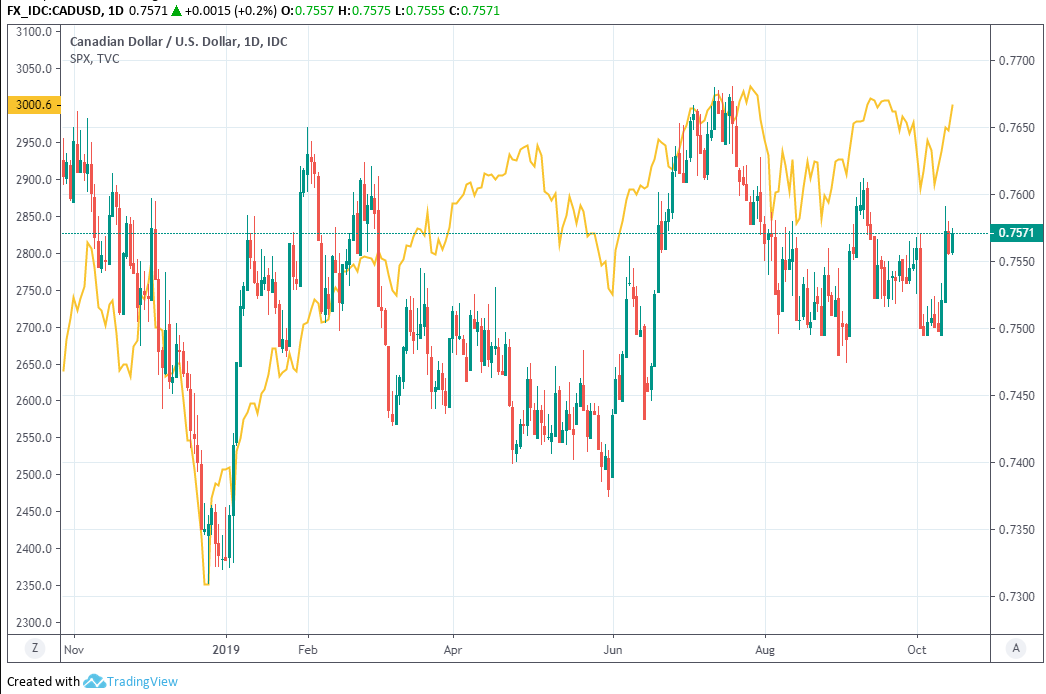The Canadian Dollar Goes On Sale at Major Bank as October Risks Stack Up
- Written by: James Skinner

Image © Pavel Ignatov, Adobe Stock
- CAD tipped as a sell at UBS as losses seen into year-end.
- Election, trade war, BoC and stock markets all risks to CAD.
- Says selling CAD an "attractive" bet on slower global growth.
The Canadian Dollar held its own in a market that was inhospitable to commodity currencies Tuesday but is likely to beat a lengthy retreat into year-end, according to strategists at UBS, who've told clients of the bank that selling the Loonie is a good way to bet on the nascent global economic slowdown continuing for a while yet.
Investors eschewed commodity exposed currencies throughout much of the European session Tuesday as FX markets continued to express scepticism over whether the ink will ever get to dry on the accord struck last week between the U.S. and China last week before hostilities between the world's two largest economies are renewed again. The U.S. Dollar has rebounded out of last week's trough in recent days to the detriment of most other major currencies.
Canada's Dollar was an exception to the commodity currency trend Tuesday amid a strong performance from stock markets across the global, although most notably the U.S. S&P 500 index. The Loonie's correlation with the latter has recently increased. Earnings reports were the main driver behind the increase, as well as relief over the restraint shown by the White House when announcing sanctions against the government of Turkey overnight. Those sanctions were milder than markets thought they'd be.
Pound Sterling, which was boosted by fresh speculation that a Brexit deal could be reached this week, and the deeply undervalued Swedish Krona were the only two currencies to get the better of the Canadian Dollar Tuesday. The Loonie is still the best performing major currency of 2019 and has gained 3.19% against Sterling this year and more than 10% against the Krona.

Above: Canadian Dollar performance Tuesday Vs major rivals. Source: Pound Sterling Live.
The trade war and its impact on the global economy is one of the reasons UBS is tipping the Loonie for a decline in the months ahead, although there are other factors at play too, including the October 21 election. Polls suggest a tight race between Canada's two established parties, the Liberal Party of Prime Minister Justin Trudeau and the Conservative Party led by Andrew Scheer.
"CAD has weakened in the immediate aftermath of the past three Canadian elections but it's hard to argue for a distinct pattern," says UBS' Vassili Serebriakov, in a recent note to clients. "Elections are rarely major trend-setting events for CAD and we expect economic developments to move back to the forefront as the October BoC meeting draws closer."
Tightness in opinion polls might normally engineer volatility in Canadian exchange rates with any other election but similarities in the economic programs of the two main parties could see politics fall by the wayside as a driver of the currency as soon as the ballot is out of the way. Serebriakov says the October 30 Bank of Canada (BoC) interest rate decision, as well as developments in the trade war and U.S. stock markets, will have more of a lasting impact.

Above: CAD/USD rate shown at daily intervals alongside S&P 500 index (yellow line, left axis).
The BoC will announce its next rate decision at 15:00 on October 30, just hours before the Federal Reserve (Fed), and markets will scrutinise its statement as well new economic forecasts closely for clues about the Canadian outlook. The Fed has already slashed U.S. rates twice this year and many say it could do so again this month, which would put the BoC under pressure to follow suit, especially if it wants to avoid a further appreciation of the Canadian Dollar.
"We believe the combination of risk sensitivity and muted BoC easing expectations makes CAD shorts an attractive play on the global growth slowdown," Serebriakov says. "The BoC was hesitant to jump to conclusions in September despite the clear worsening of the global trade policy and growth."
The BoC has left Canada's cash rate unchanged at 1.75% all year and said only that it will "pay particular attention to global developments and their impact on the outlook for Canadian growth and inflation" when making future decisions, even though four of the ten major central banks have already cut rates in 2019 and others could soon follow suit if their economies are snared by the ongoing deceleration of global growth. The BoC's stance has been made possible by an outperforming economy.
BoC rate policy has been invaluable in making the Loonie the best performing major currency of 2019 but the bank has described recent economic strength as temporary and repeatedly expressed concerns about the impact the trade is having on business investment. Serebriakov says the October 22 Business Outlook Survey could ultimately prompt the BoC to warn of rate cuts ahead if the latest feedback from Canada's companies is negative.

Above: USD/CAD shown at daily intervals.
"To the extent that the central bank tends to take strong cues from changes in business sentiment, any signs of deteriorating investment and hiring outlook in the survey could prompt BoC to turn more dovish than is currently priced in," Serebriakov says. "USDCAD has gained some upside momentum, which, in combination with the global slowdown and downside equity risks, we think makes it an attractive play on a global growth slowdown at the moment. We target 1.36 in USDCAD by year-end."
Pricing in the overnight-index-swap market implied on Tuesday, an October 30 BoC cash rate of 1.74%, suggesting investors see almost no chance of a rate cut this month. Meanwhile, the implied rates for January 22 and March 04 were 1.66% for each of those meetings, which suggests investors see a meaningful chance of a cut by then but are still a long way off considering it a done deal.
If those implied cash rates fall toward the 1.5% level that would prevail in the wake of a typical 25 basis point cut then the Canadian Dollar would likely come under pressure, but the BoC is not the only headwind faced by the currency because Serebriakov has also flagged the stock market as a risk.
The Loonie's correlation with the S&P 500 has increased of late and the benchmark, which is up a lofty 20% for 2019, might suffer if the U.S. and global economies slow further for any reason. Stock markets would be vulnerable upon any fresh hostilities between the U.S. and China, while a Fed that proves reluctant to cut rates this month might also darken the outlook for share prices.
Serebriakov and the UBS team are betting the above cocktail of risks drive the USD/CAD rate up to 1.36 by year-end, from 1.32 Tuesday.
Time to move your money? Get 3-5% more currency than your bank would offer by using the services of a specialist foreign exchange specialist. A payments provider can deliver you an exchange rate closer to the real market rate than your bank would, thereby saving you substantial quantities of currency. Find out more here.
* Advertisement




